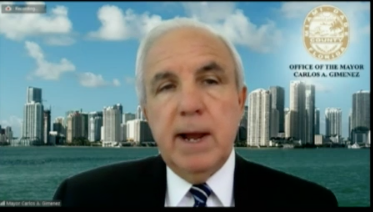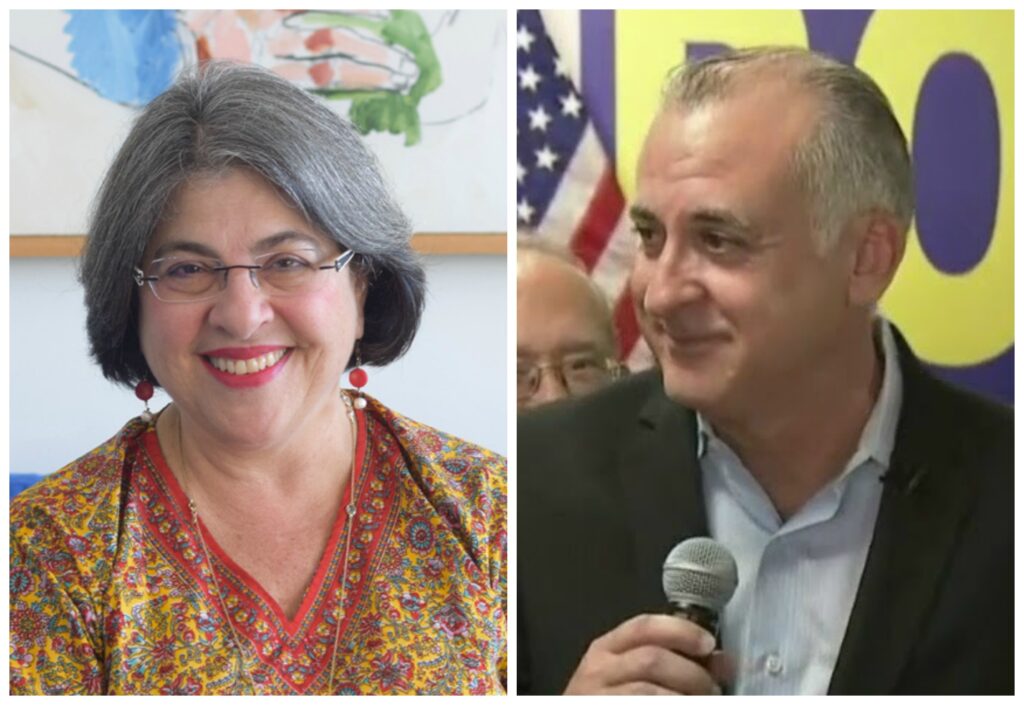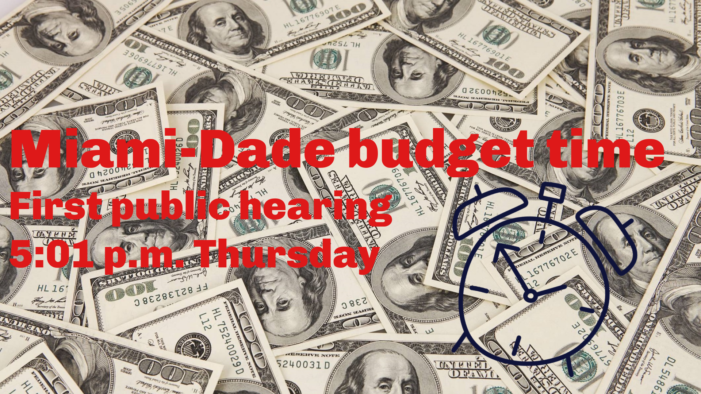The Miami-Dade County Commission will meet Thursday to consider the $9 billion proposed annual budget for 2020-2021– the first post COVID-19 budget and the last one for Mayor Carlos Gimenez and at least five commissioners who are termed out in November.
And it won’t be easy.
Gimenez said in his budget memo that his administration has tried to maintain property tax rates, add positions and avoid layoffs all at the same time. How is he going to pull off that hat trick?
Fee increases, in part.
Gimenez has proposed a series of fee increases for off-duty fire rescue services, library services, parks and recreation uses, regulatory and consumer services (permits?), residential and commercial solid waste disposal, and water and sewer, among others.
So, taxes will increase anyway, for anyone whose property value increases, because the tax rate will stay the same, and residents and business owners will also have to pay more in fees for practically everything. There are 60 pages worth of fee increases attached to the budget memo (which you can find here in the agenda).

“When the proposed budget was developed, we assumed that businesses, schools and all other elements of our community would be back to normal by October 2020,” wrote Gimenez in the memo that introduces the first budget hearing, which begins at 5:30 p.m. You can watch here.
“However, we are still feeling the effects of our efforts to mitigate the impact of the COVID-19 pandemic as a county and community,” Gimenez says in his memo. “Activities that affect the overall economy of our community, as well as the revenues that accrue to government are still limited and may have a more prolonged recovery period than originally assumed.”
Not only is the county spending more across all county departments but proprietary revenues — like those of the Miami International Airport, which has been hit hard by the pandemic, with an 85% drop in air traffic — are also suffering. That’s why there’s likely going to be a delay on the employee parking garage, even though there are a slew of hangar and other airport use fee hikes.
Read related: Miami-Dade’s Carlos Gimenez hoards COVID-19 CARES money, irks cities
And while many pandemic response-related costs will be reimbursed through the Federal Emergency Management Agency and/or CARES Act and other federal funding — which municipal mayors say Gimenez has been hoarding — there could be costs that are not covered.
“It is still too early to tell if all COVID-19 related expenses, including negotiated hazardous pay supplements, will be reimbursed,” he said (and did he just throw the unions under the bus?), recommending that all the county’s current reserves be set aside for the expenses that are not reimbursed as well as revenue losses that may still be unforseen.
The proposed budget also has money set aside for an additional 27 positions in the Internal Services (procurement) department, reportedly needed to support various capital infrastructure projects throughout the county, and one additional position in Fire Rescue (increasing total employees to 28,627).
The revised or adjusted budget commissioners will look at Thursday has $25.5 million more in grants and proprietary revenues than the preliminary budget prepared in July. There can be changes made between Wednesday and the second public budget hearing on Sept. 17.

Look for the two mayoral candidates, especially the self-proclaimed conservative Esteban Bovo, to use the meeting to campaign. Especially since activists have already said they want to spend less on police and jails — which eats up almost half of the $2.2 billion general fund — and more on homeless services and other social programs.
That is one point on which Bovo and Commissioner Daniella Levine Cava, who is in the Nov. 3 runoff with him, are on extreme opposite sides. Bovo has made it a campaign issue, drumming up support among scared elderly voters who think Levine Cava will bring “another Portland or New York,” as he likes to say and probably will again Thursday.
Read related: Esteban Bovo leads mayoral race, goes to runoff vs Daniella Levine Cava
This is also the first budget hearing conducted virtually, as allowed by the state emergency order that lets governments conduct meetings remotely. There has been mixed feelings about how this impacts public participation. Some say it allows for more people who can’t physically get downtown to participate while others point to technical difficulties and social/economic differences that may keep some people from participating at all.
The virtual meetings also mean there are no seas of colored T-shirts advocating for one issue or group or another and commissioners don’t have to see the people talking to them, which makes them easier to ignore.
On Monday, faced with a number of speakers on public hearings and the Biscayne Bay task force issue (more on that later), Commission Chairwoman Audrey Edmonson limited public comments to one minute per person instead of two. Will she do the same for the first budget hearing, where there could be hundreds of people lined up (online) to speak?

